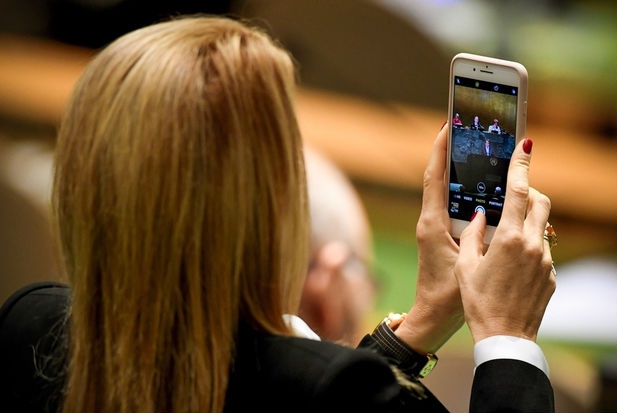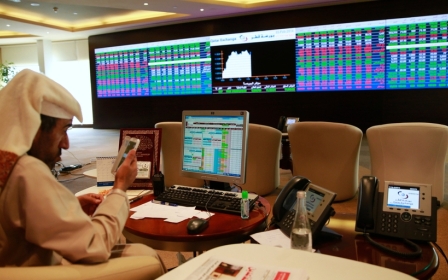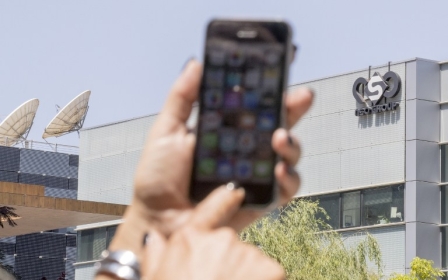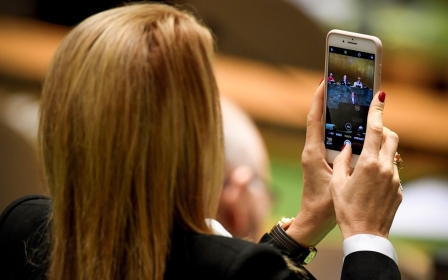Israeli firm reached spyware deal with Saudi Arabia before political purge: Report

A Tel Aviv-based company offered Saudi Arabia a system that hacks mobile phones a few months before Crown Prince Mohammed bin Salman (MBS) began his purge of regime opponents in 2017, according to a complaint to the Israel police now under investigation, an Israeli newpaper has said.
Haaretz reported on Sunday that a series of meetings involving technology supplied by the company NSO Group led to the signing of a deal with Saudi intelligence in the summer of 2017.
The findings tie in with ongoing remarks by Israeli Prime Minister Benjamin Netanyahu who has repeatedly expressed his wish to strengthen ties with Gulf states, particularly through the sale of advanced Israeli technology.
While Netanyahu has defended the sales as part of a strategic battle against Iran, several reports have shown the technology being used by Gulf states against their own citizens.
Haaretz said its investigation into the deal was "based on testimony and photos, as well as travel and legal documents".
According to the newspaper, one of a series of meetings centered around the deal took place in June 2017 at a hotel in Vienna.
It said those attending the meeting included Abdullah al-Malihi, a close associate of Prince Turki al-Faisal – the former head of Saudi Arabia's intelligence services – and another senior Saudi official, Nasser al-Qahtani, who presented himself as the deputy of the current intelligence chief.
Two Israeli businessmen, representatives of NSO, then showed the company's latest technology to the Saudis, Haaretz said.
Middle East Eye has previously reported on NSO's Pegasus spyware, known as a "one-click system", whereby the victim has to press a link sent to them through phishing.
NSO's latest Pegasus 3 system no longer requires this, with only the number of the SIM card needed to hack into the phone.
Once a phone is hacked, the speaker and camera can be used for recording conversations, while even encoded apps such as WhatsApp can be monitored.
According to Haaretz, the NSO representatives sent Qahtani to a nearby shopping centre to buy an iPhone and give them its number.
They then demonstrated how this was enough to hack into the new phone and record and photograph the participants in the meeting.
Police complaint
Many of the details of the case came to light after an unnamed European businessman involved in the meetings made a complaint to the Israeli police.
The businessman said events first began when a man only identified as 'W', who was an Israeli dealing in defence-related technologies, phoned him asking for help to do business in the Gulf.
Among the businessman's contacts were the two senior Saudi officials, Malihi and Qahtani.
According to Haaretz, a meeting, also in Vienna, was arranged in April 2017 between Malihi, Qahtani and representatives of several Israeli companies.
The European businessman said that the Saudis passed along to the representatives of one of the companies details of a Twitter account of someone who had tweeted against the government.
They wanted to know who was behind the account, but the company refused to say.
At the Vienna meeting in June 2017, the Saudis expressed an interest in the NSO technology and, according to the businessman, after several meetings an agreement was made the following month to sell Pegasus 3 to the Saudis for $55m.
The businessman said he had agreed orally with 'W' that his commission in the deal would be 5 per cent – $2.75m - but that he did not receive the money.
In a response to Haaretz, NSO said it: "Operated and operates solely in compliance with defence export laws and under the guidelines and close oversight of all elements of the defense establishment, including all matters relating to export policies and licenses.
"The information presented by Haaretz about the company and its products and their use is wrong, based on partial rumours and gossip. The presentation distorts reality."
Saudi crackdown
The Pegasus deal revealed by Haaretz came just months before members of the Saudi royal family, government ministers and business tycoons were caught up in a sudden wave of arrests orchestrated by MBS under the banner of an anti-corruption drive.
In the following months, the Saudis continued their hunt for regime opponents living abroad, culminating in the murder of journalist Jamal Khashoggi in the Saudi consulate in Istanbul on 2 October.
Governments that use these technologies have something to be scared of, and have no respect for human rights
- Yehia Assiri, human rights activist
Less than two weeks before Khashoggi's death, MEE had reported on findings by Citizen Lab, a research and development organisation at the University of Toronto, that tracked the use of NSO's Pegasus system between August 2016 and August 2018.
The report showed that spyware produced by the company had witnessed "significant expansion" of usage in Saudi Arabia, the United Arab Emirates and Bahrain.
Amnesty International said in August that a staffer received a message via WhatsApp from a number they did not recognise about a protest supposedly taking place at the Saudi embassy in Washington, DC.
"When Amnesty's tech team analysed the message, we found that clicking the link would have installed highly potent spyware - the Saudi protest was just carefully chosen bait," said the international human rights watchdog, adding that a closer look into the domain name tied it to NSO.
'Worst of the worst'
According to Citizen Lab and an article in Forbes magazine, Saudi Arabia used NSO technology to spy on satirist Ghanem Almasarir, human rights activist Yehia Assiri who lives in London, and activist Omar Abdulaziz, who lives in exile in Canada.
All three men had been in contact with Khashoggi.
In September, Assiri told MEE that "governments that use these technologies have something to be scared of, and have no respect for human rights".
Assiri, a former air force officer who heads the rights advocate group ALQST, said in a phone interview that it was also a reflection of these governments' lies.
"They publicly claim their animosity towards Israel, but secretly use its products to spy on activists whom it then accuses of treason," he said.
Last month, US whistleblower Edward Snowden, claimed that Pegasus had been used by the Saudi authorities to surveil Khashoggi.
"They are the worst of the worst," Snowden said of NSO.
Middle East Eye propose une couverture et une analyse indépendantes et incomparables du Moyen-Orient, de l’Afrique du Nord et d’autres régions du monde. Pour en savoir plus sur la reprise de ce contenu et les frais qui s’appliquent, veuillez remplir ce formulaire [en anglais]. Pour en savoir plus sur MEE, cliquez ici [en anglais].




